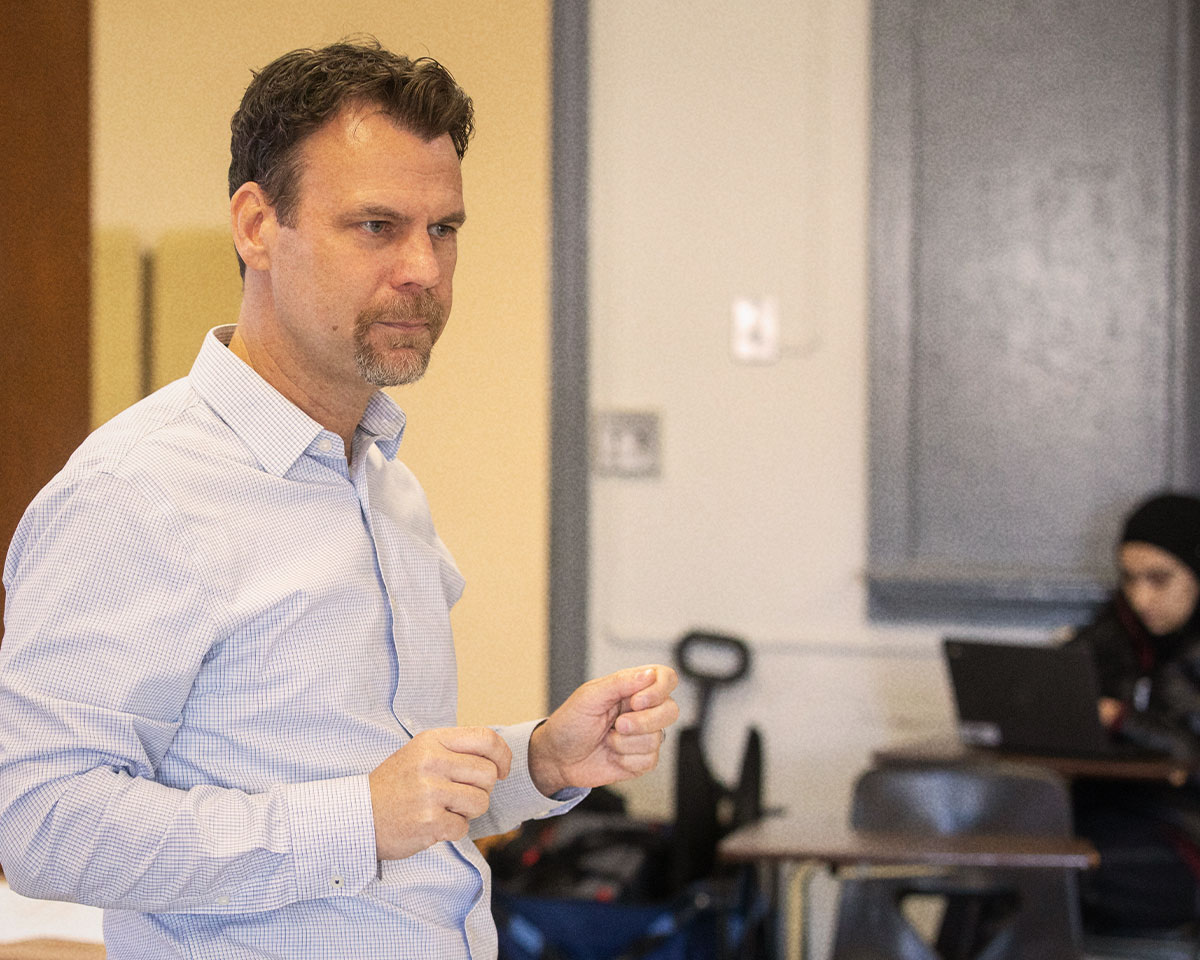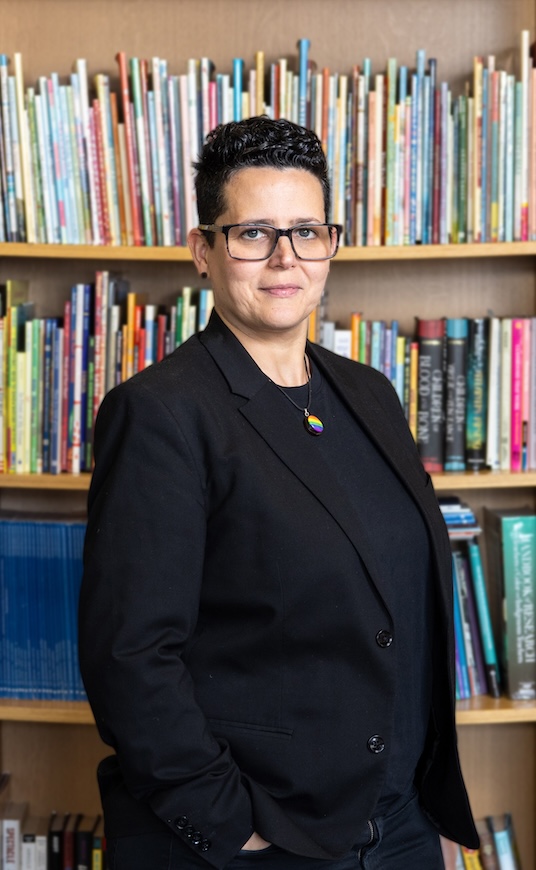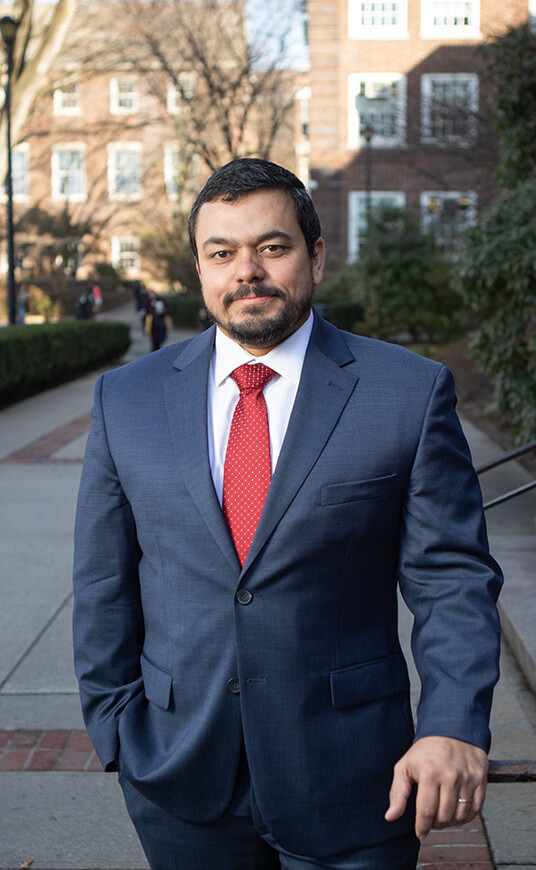School Psychologist, M.S.Ed.
School of Education
Program Overview
The school psychologist master’s degree program is a 33-credit curriculum in theory, research, and evidence-based practice, followed by the 27-credit advanced certificate. Together, students will obtain 60 credits required for certification in New York State and eligibility for the National Association of School Psychologists credential. Students collaborate with faculty and build professional portfolios showcasing their advanced skills. We prepare our graduates to work with ethnically and racially diverse populations in urban public and private schools across a variety of ages, abilities, and specialized populations.

Program Details
The program information listed here reflects the approved curriculum for the 2023–24 academic year per the Brooklyn College Bulletin. Bulletins from past academic years can be found here.
Program Description
The school psychologist graduate program comprises an M.S.Ed. and an Advanced Certificate in school psychology and consists of a 60-credit curriculum in theory, research, and evidence-based practice. The program is registered with the New York State Department of Education, and has full approval from the National Association of School Psychologists (NASP). Upon completion of the 33-credit M.S.Ed. and then the 27-credit Advanced Certificate, graduates are eligible to apply for certification in school psychology with New York State and to apply for the Nationally Certified School Psychologist (NCSP) credential with the NASP. Students collaborate with faculty and build professional portfolios that include publications and presentations at local and national conferences.
Matriculation Requirements
Applicants:
- Must offer at least nine credits with a grade of C or higher in psychological tests and measurements, statistics in psychology, and educational psychology or developmental psychology.
- Must present three credits with a grade of C or higher in an education course in reading instruction or reading disorders.
- Must have a minimum undergraduate scholastic index of 3.00 (B) .
- Are interviewed and must submit appropriate letters of recommendation. Although not mandatory as a requirement for admission, applicants are encouraged to submit GRE scores (general and/or subject: psychology) as additional evidence to support the application.
Applicants who have not completed all the specific course requirements are given individual consideration and may be admitted with conditions, with the approval of the program head.
Students should note additional requirements found at the beginning of this section as well as in the sections “Admission” and “Academic Regulations and Procedures” in the Graduate Bulletin.
Program Requirements (33 Credits)
Thirty-three credits are required for the degree, selected from the following courses: SPCL 7931T, 7932T, 7903T, 7922T, 7911X, 7900X, 7923X, 7901X, 7910X, 7912X, 7913X, 7920X, 7921X, 7906X, 7907X, 7915X.
Students must maintain a cumulative grade point average of at least 3.00 (B). A student who acquires six credits below B- cannot be awarded an M.S. in education in this program.
The program of study must be approved by the department.
Student Learning Outcomes
The School Psychologist Graduate Program training goals are consistent with ethical guidelines of the National Association of School Psychologists and the American Psychological Association. A program of training and extensive field experiences develops the following competencies.
- Proficiency in psycho-educational assessment related to school difficulties and learning disorders with the ability to translate these results into appropriate models of service delivery.
- Proficiency in psychological assessment related to behavior, personality and mental disorders with the ability to translate these results into appropriate models of service delivery.
- Proficiency in implementation of prevention strategies, and direct and indirect intervention approaches to serve all students’ needs, particularly those with disabilities and the ability to evaluate the results of service outcomes.
- The ability to engage in collaborative practice and implement a range of contextually appropriate consultative services.
- Familiarity with the organization of schools, including general and special education, and developmentally appropriate curriculum approaches for children with diverse educational needs.
- An understanding of research methodologies and the ability to implement applied research in complex urban school environments.
- A capacity for critical self-reflection to gain insight on self and others for the purpose of evaluating and improving service delivery and nurture a strong commitment to ethical guidelines of professional practice.
- An understanding of the full range of diversity in the human condition, including, racial, cultural, ethnic, linguistic, socioeconomic, gender, sexual orientation, individual differences/disabilities, and a willingness and capability to work with all populations.
- A commitment to promote school policies and ethical practices that advance social justice and expand opportunities for all children.
- A capacity to use technology to develop and enhance school psychology practice.
Admissions Requirements
- Fall Application Deadline: March 1
- Spring Application Deadline: The program does not accept applications for spring.
Supporting Documents for Matriculation
Submit the following documents to the Office of Graduate Admissions:
- Transcripts from all colleges and universities attended. Applicants who earned a bachelor’s degree outside the United States need to submit a course-by-course international transcript evaluation. See Graduate Admissions for more information.
- Two letters of recommendation
- Résumé
- Attach a brief biographical statement of 500 to 1,000 words describing your reasons for pursuing the specific graduate program to which you are applying and your future professional goals.
Selected candidates are interviewed by academic department.
Required Tests
- F-1 or J-1 international students must submit English Proficiency Exam. TOEFL—79, IELTS—6.5, PTE—58–63, Duolingo—105–160.
All students accepted in to the School of Education are required to submit fingerprint verification before signing up for most education classes. Verification is needed if you already have fingerprint records or not. Read the instructions and if you have questions about the instructions, you can contact Helen Spencer via e-mail.
Refer to the instructions at Graduate Admissions.
Contact
Paul McCabe
1107 James Hall
E: paulmc@brooklyn.cuny.edu
P: 718.951.5876
Or contact:
Office of Graduate Admissions
222 West Quad Center
2900 Bedford Avenue, Brooklyn, NY 11210
E: grads@brooklyn.cuny.edu
P: 718.951.4536
Office Hours
Mondays–Fridays, 9 a.m.–5 p.m.
To make an appointment with a graduate admissions counselor, visit:
The Support You’ll Find
Brooklyn College is an integral part of the cultural and artistic energy of New York City. Our faculty members in the Department of School Psychology, Counseling, and Leadership offer incomparable expertise and tremendous talent, and each brings a unique perspective to their teaching and mentoring in and out of the classroom.
Internships and Employers
Students complete internships in public and private schools throughout the New York City region as well as across the United States. The internship is a full-time, 10-month supervised experience designed to hone the requisite skills and knowledge to work as a school psychologist. Our graduates are hired by school districts, hospitals, clinics, early childhood centers and universities, both locally and nationwide. Given the strong demand for school psychologists nationally, all of our graduates find gainful employment shortly after graduation.





